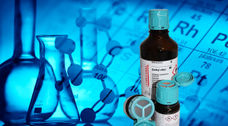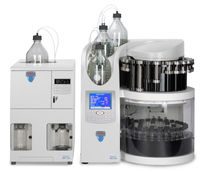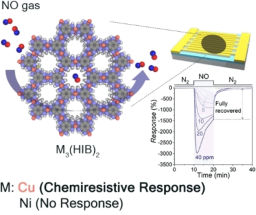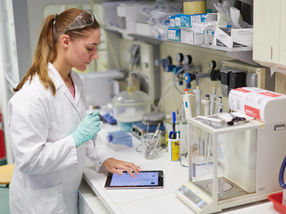Technological breakthrough in the fight to cut greenhouse gases
Scientists at Newcastle University have pioneered breakthrough technology in the fight to cut Greenhouse Gases. The Newcastle University team, led by Michael North, Professor of organic chemistry, has developed a highly energy-efficient method of converting waste carbon dioxide (CO2) into chemical compounds known as cyclic carbonates. The team estimates that the technology has the potential to use up to 48 million tonnes of waste CO2 per year, reducing the UK's emissions by about four per cent.
Cyclic carbonates are widely used in the manufacture of products including solvents, paint-strippers, biodegradable packaging, as well as having applications in the chemical industry. Cyclic carbonates also have potential for use in the manufacture of a new class of efficient anti-knocking agents in petrol. Anti-knocking agents make petrol burn better, increasing fuel efficiency and reducing CO2 emissions.
The conversion technique relies upon the use of a catalyst to force a chemical reaction between CO2 and an epoxide, converting waste CO2 into this cyclic carbonate, a chemical for which there is significant commercial demand. The reaction between CO2 and epoxides is well known, but one which, until now, required a lot of energy, needing high temperatures and high pressures to work successfully. The current process also requires the use of ultra-pure CO2 , which is costly to produce.
The Newcastle team has succeeded in developing an exceptionally active catalyst, derived from aluminium, which can drive the reaction necessary to turn waste carbon dioxide into cyclic carbonates at room temperature and atmospheric pressure, vastly reducing the energy input required.
Professor North said: 'One of the main scientific challenges facing the human race in the 21st century is controlling global warming that results from increasing levels of carbon dioxide in the atmosphere.
Professor North believes that, once it is fully developed, the technology has the potential to utilise a significant amount of the UK's CO2 emissions every year.
Topics
Organizations
Other news from the department science
These products might interest you

ERBAdry by CARLO ERBA Reagents
Anhydrous solvents from CARLO ERBA Reagents in a clever redesign
ERBAdry series impresses with the latest generation of septa and sealing caps

Thermo Scientific™ Dionex™ ASE™ 150 or 350 Accelerated Solvent Extractor systems by Thermo Fisher Scientific
Accelerated Solvent Extraction (ASE) – Maximize results and reduce errors in food analysis!
More extractions in less time using less solvent

Get the chemical industry in your inbox
From now on, don't miss a thing: Our newsletter for the chemical industry, analytics, lab technology and process engineering brings you up to date every Tuesday and Thursday. The latest industry news, product highlights and innovations - compact and easy to understand in your inbox. Researched by us so you don't have to.








![[Fe]-hydrogenase catalysis visualized using para-hydrogen-enhanced nuclear magnetic resonance spectroscopy](https://img.chemie.de/Portal/News/675fd46b9b54f_sBuG8s4sS.png?tr=w-712,h-534,cm-extract,x-0,y-16:n-xl)














































